Home Solar Inverters 5kw Solar Inverter Price
5kW Solar Inverter Price
When selecting an inverter for your solar panels, choose from the leading brands. It enhances the efficiency of your solar system.
A good-quality 5kW single-phase solar inverter costs $1,320 – $2,500. A 3-phase solar inverter costs between $1,900 and $2,300, depending on the quality.
While inverters have a 15-year lifespan, but some makes and models are more reliable than others. Speak to your local installer about the best brands and models currently available.
Table of Contents
ToggleTypes of inverters
String/ central inverters
It is the most common type of inverter used in residential settings. A string inverter involves a single inverter connected to several solar panels.
String inverters are durable and robust. They are affordable and easy to maintain.
There are several disadvantages to using the string inverter. First, all the solar panels connect to a single inverter. If one solar panel falls under shade, it will affect the output of the whole system.
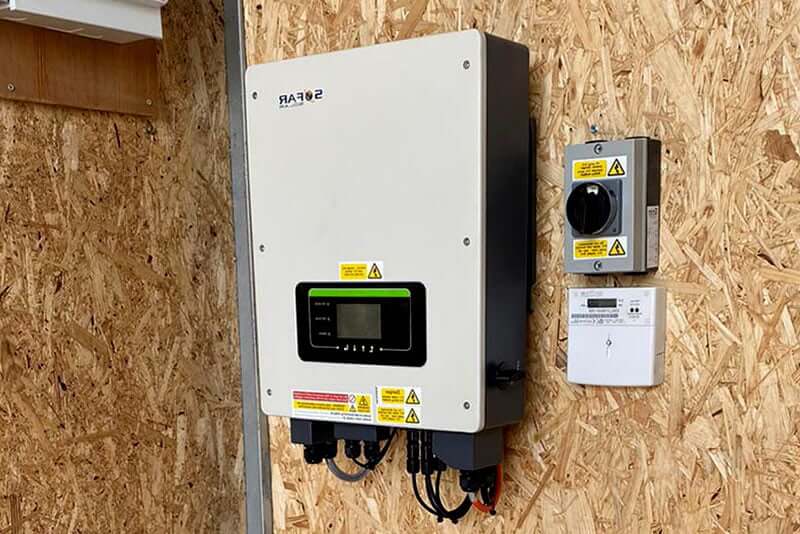
Second, you cannot expand a solar system that uses a string inverter. You cannot change the rating of the string inverter to another.
If you use string inverters, install your panels away from trees or other causes of shade around or near your panels.
Microinverters
Microinverters are inverters attached to each panel individually. Thus, they deliver more power compared to string inverters.
Microinverters are not affected by shade on a single panel. Unshaded panels continue to provide power to the system.
They are most suitable for residential buildings and when you have limited space on your roof. If you have a complicated installation design, use microinverters to get the most from every panel.
Additionally, you can monitor them remotely. They are also expensive to purchase and install.
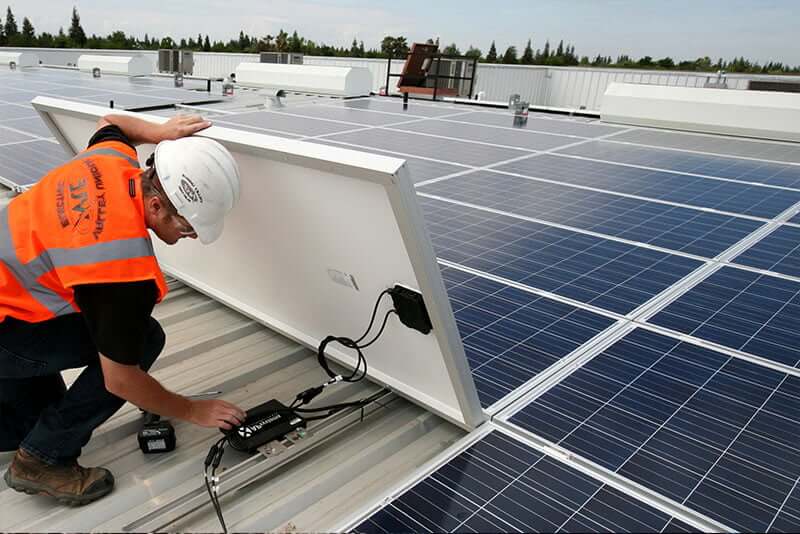
Power optimized string inverters
Optimized string inverter systems are when you have a string inverter for your solar system coupled with optimizers on each solar panel.
As a result, your string inverter will now work similarly to microinverter systems.
Each solar panel in the array is optimized to produce without having to rely on others. Unlike with pure string inverters, shading on a single panel will not affect the output of the rest.
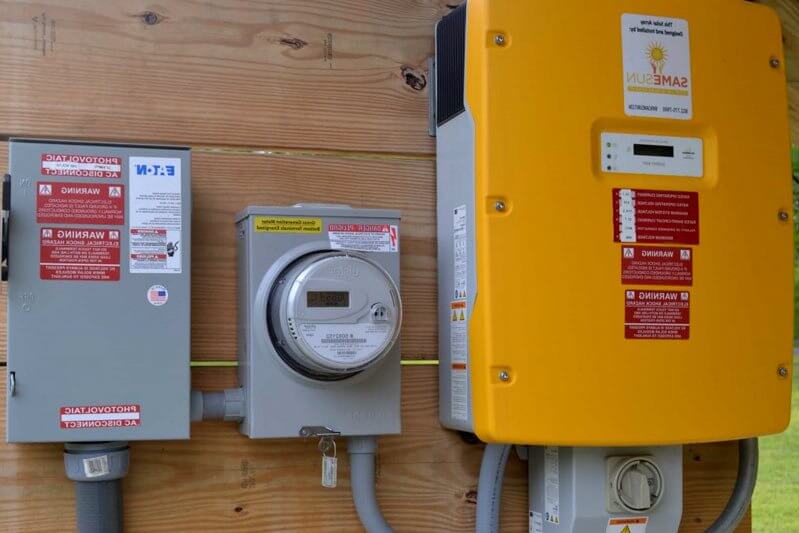
Hybrid inverters
A hybrid inverter is also known as a multi-mode inverter. It can work in different modes. It can work for solar panels on the grid and off-grid. It can also store electricity and provide backup.
It can convert DC power to AC power and also convert the stored AC power in batteries to electricity.
If you live off the grid or you have regular blackouts, use hybrid inverters on your solar panels.
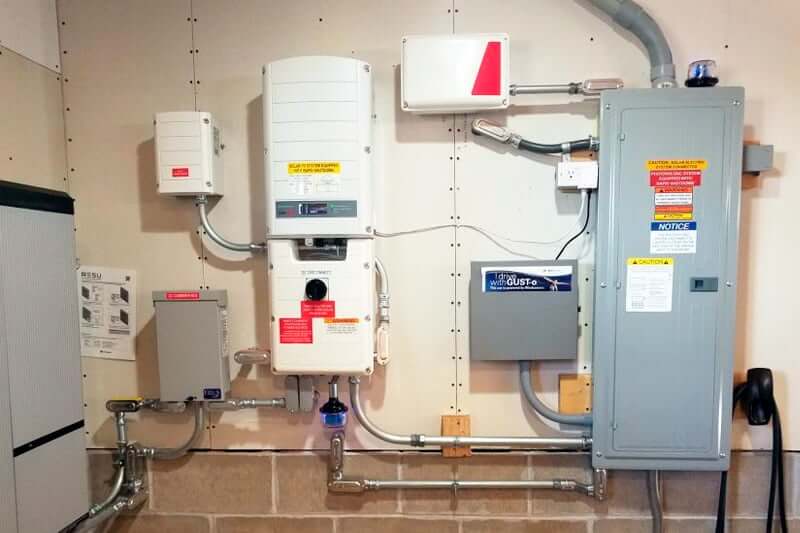
Factors to consider when buying an inverter
Price and how to pay
Inverter cost is 20% of the total cost of the system. The more expensive your inverter, the higher the cost of your solar system and the longer it will take to make a return on your investment.
Depending on whether you have a single, double, or three-phase electricity system, you will pay $1,000 – $2,400 for a 5kW inverter.
When purchasing an inverter, do not go for the cheapest in the market. Often, it is a poor-quality product that you will replace before the expected lifetime is over. Making your system more expensive.
Additionally, it will affect the productivity of your solar system.
Approved for use in Australia
The Clean Energy Council has an approved list of inverters to be used in Australia. These inverters meet all the required approval standards.
When you purchase a new solar system you will get a subsidy. You can only benefit from the subsidy if you buy approved solar panels and inverters from an approved retailer.
Manufacturer
Find information on the manufacturer of the inverter you choose to buy. Find out how long they have been in operation and if they have offices or agents in Australia.
Buy from reputable manufacturers with local offices you can contact.
Capacity of the inverter
The capacity of the inverter you purchase depends on the size of your solar system. Always buy an inverter that can handle the amount of power your panels are likely to produce.
Sometimes, a lower-rated inverter is used with a larger solar system. For example, a 5kW inverter is suitable for use with a 6.6kW solar system.
There are system losses as solar panels convert sunlight to electricity. It allows for the use of lower-rated inverters.
Warranty
Make sure that the inverter you buy has a long enough warranty. You expect that a quality inverter will last as long as your solar panel.
A warranty ensures that you can contact your retailer or inverter manufacturer and they will take care of any problems on the inverter for free.
Many manufacturers offer a minimum 10-year warranty for their inverters. Inverters have a 10-20 year lifespan. You may pay a small fee to extend the warranty to cover the lifetime of the inverter.
Consider the warranty of the inverter, features, and expectations of your solar system before you purchase a particular inverter brand.
Expandability
When purchasing a solar system, you must consider your current and future power requirements. If you find that you may have to increase your solar panels in the future, buy an expandable inverter.
When you buy additional solar panels, you will not have to buy another inverter if your current one is expandable.
Weather proof
Depending on the brand of the inverter, you must meet certain conditions to keep it in warranty. An important condition is installing the inverter in a shaded area.
If a manufacturer or installer knows that their inverter does not work well when exposed to harsh weather conditions, they will provide an installation cage.
They will also advise their customers on the best way to use their inverters if they live in areas with extreme weather variations.
The better your inverter is protected from extreme weather changes the better it works. For this reason, most people may install it in the house or build a shaded area for the inverter.
High-quality inverters can withstand weather variations when installed as advised. They are likely to work well for a long time.
However, low-quality and cheap inverters are unlikely to live out their full-rated lifespan due to the harsh Australian weather.
Importance of an inverter to a solar system
- Solar panels convert sunlight into Direct Current (DC) electricity. The inverter then converts the DC electricity into usable Alternating Current (AC) electricity.
- Allows self-monitoring of power output from your solar system. Depending on the technology of the inverter, you monitor remotely or on the display unit on the inverter.
- Save energy and money.
- With the right capacity inverter, you can get the maximum power your solar panels produce.
- Enhance the safety of a solar system.
- Grid assistance capabilities.
- You can monitor the activity of every solar panel on your system depending on the type of inverters you use and solar panel design.
Hire an approved installer for your solar system
If you want to install a new solar system, here is a free tool that you can use.
Gosolarquotes.com is a free tool that connects homeowners to accredited solar panel installers.
- At the top of the tool, enter your zip code.
- Then, fill out the subsequent form to provide more information on your house size and electricity consumption.
- You will then receive three quotes from professional installers with no obligation to hire them. Compare the quotes and choose one of the installers to install the solar system for you.
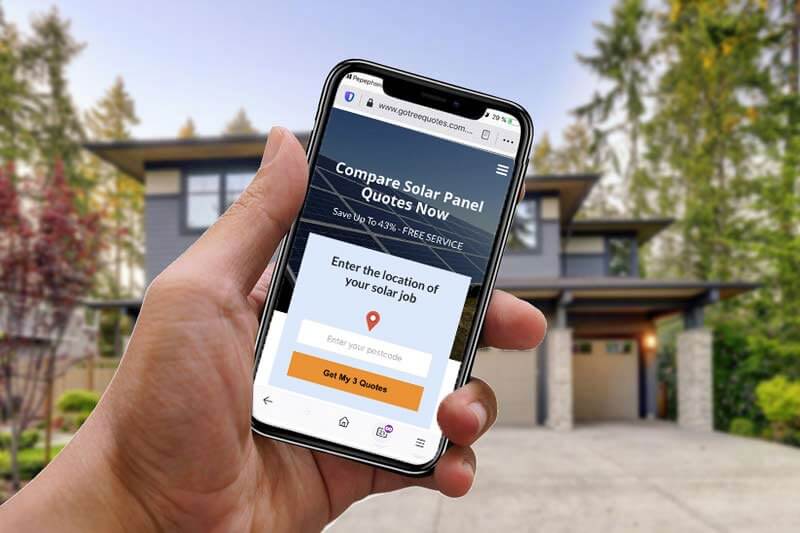
Compare Solar Panel Quotes
Table of Contents
Toggle









